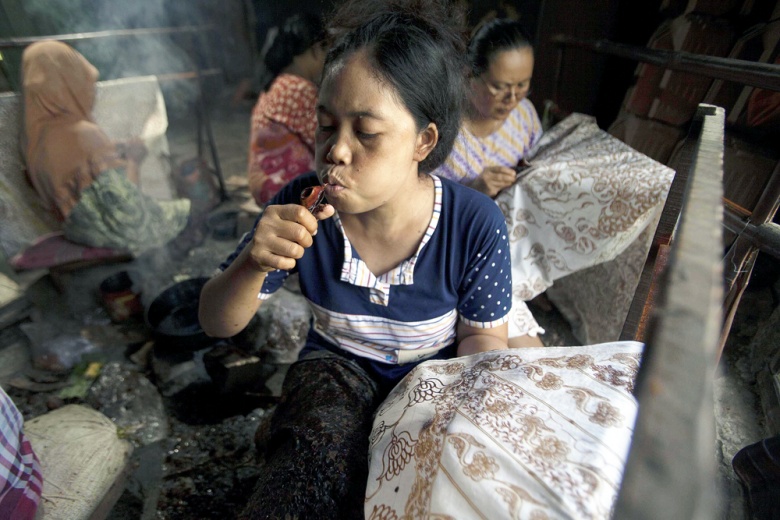Popular Reads
Top Results
Can't find what you're looking for?
View all search resultsPopular Reads
Top Results
Can't find what you're looking for?
View all search resultsRescuing batik industry from COVID-19
To date, batik entrepreneurs have reported a striking sales decrease by up to 30 percent. With such a sharp decline, it would be difficult for entrepreneurs to pay their employees’ wages and maintain their business.
Change text size
Gift Premium Articles
to Anyone
T
he world has seen a slowdown due to the COVID-19 pandemic. News and reports in print, digital and social media highlight not only the victims of the disease but also the dire impacts the pandemic has had on our daily lives. The pandemic has severely impacted the economy, including the creative industry, specifically the fashion industry.
More than 50 percent of Indonesia’s exports from the creative economy originate from the fashion industry. Two of the major contributors to fashion industry exports are batik clothing and hijab.
Let me focus on how to ensure that we are able to maintain growth in the batik industry amid the global crisis. Long before the term creative economy was coined, activities that led to the birth of valuable products had taken place for centuries in Indonesia. One of the most identifiable Indonesian products is batik.
Scholars argue whether batik originated from Indonesia or elsewhere, yet most of these researchers agree that it was in Indonesia that batik-making reached its renaissance. The Indonesian Batik Foundation acknowledges two types of batik: hand-painted and hand-stamped, both of which require wax resistance in their making.
Against this background, the batik industry is facing a hard time because of the pandemic. The most affected are small and medium enterprises (SMEs), or the grassroots industry. SMEs usually take batik orders from large enterprises. However, while everyone is focused on the pandemic, customers are hard to find. While few buyers exist, they also tend to think twice before purchasing batik cloth, as they would rather fulfil their daily needs.
To date, batik entrepreneurs have reported a striking sales decrease by up to 30 percent. With such a sharp decline, it would be difficult for entrepreneurs to pay their employees’ wages and maintain their business.
Indeed, this is the right moment for us, Indonesians, to ask ourselves, "Are we ready to lose our very own batik industry due to COVID-19?"
I believe all Indonesians understand and appreciate the precious value of batik as our national heritage and identity. Consequently, we will do our best to ensure that the batik industry continues to thrive.
The government realizes that not only is it imperative to provide financial assistance to batik entrepreneurs but to also ensure the industry continues to grow.
The recently issued Coordinating Economic Affairs Ministerial Regulation No. 6/2020 aims to protect the batik industry by stipulating the provision of additional credit for afflicted entrepreneurs. Micro entrepreneurs could receive up to Rp 50 million (US$3,300), while small-scale enterprises could receive up to Rp 500 million.
The government is not the only entity that could lend a hand to people during this difficult time. The private sector, including banks, can play a central role in sustaining the batik industry.
First, the banking sector can provide either one-off or short-term loans to batik industry players. The loan percentage may vary from a minimum of 30 percent, in accordance to the scale of the industry. SMEs could be given a larger loan with longer payback times.
Second, unicorns like Tokopedia, JD.ID have a huge capacity to support the batik industry by reducing or even removing their consignee fees during the outbreak. As batik SMEs are in need of hard cash to sustain their industry, it would be very helpful if unicorns offered assistance by purchasing their goods that cannot be sold during the health crisis.
Third, public-private partnerships can order batik face masks. The Health Ministry has underlined the importance of wearing masks when outdoors, as part of the “new normal” protocol. Nonmedical workers are recommended to wear fabric masks. It is timely to introduce batik masks. The market for masks remains promising in the long-term.
Efforts to promote masks are also widely connected to batik diplomacy. A concerted inter-ministerial campaign to promote batik masks abroad needs to be launched. The international campaign should involve the Foreign Ministry as the focal point of Indonesia's diplomacy, the Industry Ministry and Tourism and Creative Economy Ministry, major companies and banking sector as well NGOs, such as Indonesia's Batik Foundation.
Imagine if all Indonesian ambassadors and diplomats across the globe wore batik masks. Wouldn't that signal that batik is an integral part of our nation branding and soft power? More importantly, it would also point out that despite the pandemic, Indonesia's creative industry, especially the batik industry, continues to thrive.
Batik has long been a source of pride and joy, not only in terms of it being a cultural and diplomacy icon but also an item of economic value. We must strive to find ways to help the batik industry grow despite the pandemic.
To conclude, let me quote Foreign Minister Retno Marsudi in her opinion piece in this newspaper on March 25, "We must not allow COVID-19 to divide us since we do not have the luxury of time or options".
***
Deputy director for education and culture at the Foreign Ministry’s Directorate General for Legal Affairs and International Treaties. The views expressed are his own.










